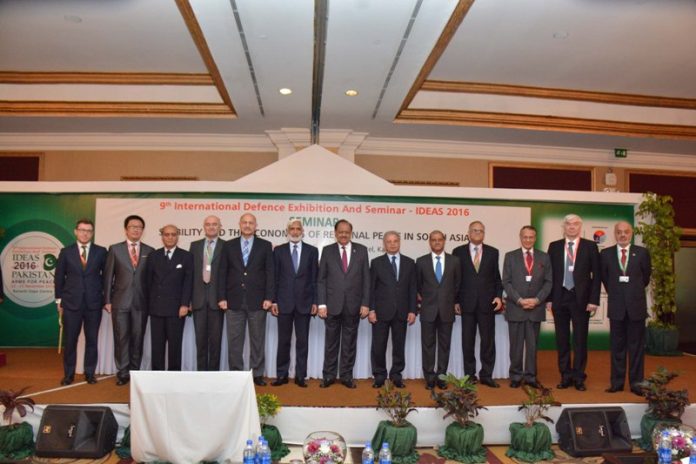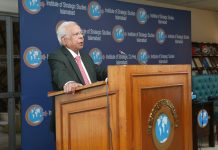Speech of Ambassador Khalid Mahmood
Chairman Institute of Strategic Studies Islamabad (ISSI)
at the IDEAS 2016 Seminar
on
“Stability and the Economics of Regional Peace in South Asia”
November 22, 2016, Karachi
Honourable Chief Guest, Director General DEPO, Distinguished Seminar Participants, Ladies and Gentlemen,
1. It is a great pleasure to welcome you all to the IDEAS-2016 Seminar. My Organization, the Institute of Strategic Studies Islamabad (ISSI) has the honour of partnering with Defence Export Promotion Organization (DEPO) in organizing this seminar. ISSI is an independent think tank, based in Islamabad. Among its multifarious activities, the ISSI conducts research and analysis, organizes national and international seminars, conferences and workshops on strategic issues, external as well as domestic.
2. This Seminar is taking place against the backdrop of a world in great flux. The security scenario around the globe is undergoing a major transformation, with a number of variable and invariable factors, each with its own complexity. With dizzying advances in technology and proliferation of related knowledge, we can see, in a not so distant future, a change of established security orders in an unpredictable manner.
3. South Asia is one of the most important regions of the world. It is home to one fourth of the entire human race; it has a vast reservoir of talent in many fields; two of the countries of the region are nuclear powers; it has the largest middle class in the world and constitutes a huge market. At the same time, the region contains the majority of the world’s poor, it is ridden with sectarian and caste beliefs and it has, for the past sixty years, devoted a disproportionate share of its resources to non-productive sectors. Most significantly, the countries of South Asia, since they achieved independence, have not been able to forge a cooperative framework that can match the European Union or ASEAN.
4. In South Asia, most of the causes of instability are present that include arms race instability, acute trust deficit, unresolved territorial disputes, provocative conventional war-fighting doctrines, lack of clarity on nuclear doctrines and a situation involving massive violation of International Humanitarian Law and Human Rights including the Right to self-determination. The region-wide, nay world-wide, twin scourge of extremism and terrorism continues to pose a formidable challenge. All these issues need clarity and solutions in order to achieve the aim of strategic stability in South- Asia.
5. Yet, by all imperatives and standards, the countries of South Asia are ideally placed to fashion, among themselves, an environment of peace and cooperation. They have an ancient shared history and are heirs to a common and proud heritage. For centuries, they enjoyed unity in diversity which brought together a variety of religions, cultures and traditions and resulted in a good deal of fusion and commonality of norms.. As independent States, they have so much that they share on which they could build upon to the immense benefit of each of them.
6. In the growing context of regional and global connectivity, in which the states have started creating frameworks and platforms for enhanced economic cooperation, the China- Pakistan Economic Corridor, better known as CPEC, is an example of the win-win situation. It presents immense opportunities for promoting the economics of peace in South Asia and beyond. In the age of geo-economics CPEC, therefore, is of immense importance, as it runs through one of the most promising geo-strategic locations in South Asia, and will act as a bridge between regions from Southeast Asia, South and Central Asia, the Middle East, Africa and Europe. For Pakistan, the CPEC will provide a big opportunity to stabilize its economy while reinforcing ties with its neighbours and making Gwadar a trade and economic hub of the region. Indeed, CPEC that includes the construction of roads, railway tracks, energy pipeline routes, and Gwadar‘s international airport, promises an asset in the region in the form of sound infrastructure essential for enhanced economic and commercial linkages.
7. Strategic stability in South Asia depends on the capacity and capability of states’ control on the domestic polarization processes and Confidence Building. Above all political will is required to resolve the existing bilateral issues. Conflict resolution mechanisms with mutual consensus should be employed to enhance the security and mutual trust level.
8. It is worth recalling that South Asia witnessed paltry gains of peace, with a paradigm shift during 2003-2008 in Pak-India relations, marked by increased people-to-people contacts, resumption of the Composite Dialogue, enhancement of economic cooperation and adoption of conventional and nuclear CBMs, as well as some progress on back channel negotiations on Kashmir. It is essential that the international community encourages the recalcitrant state to return to the path of meaningful negotiations for an early settlement of outstanding issues, including Kashmir that is today witnessing a renewed intifada and a brutal backlash by the Indian armed forces. India needs to abandon its reckless behaviour which is fraught with grave risks for the peace and security of the region. This would ensure peace and prosperity not only for the people of the two countries, but for the entire South Asian region. It will not happen quickly, and it will not be easy, but that is the only way forward.
Ladies and Gentlemen,
9. The program of the Seminar consists of presentations by five distinguished speakers, three from abroad and two from Pakistan. They will explore from different angles the Seminar theme; “Stability and the Economics of Regional Peace in South Asia”.It is my hope that their keen analyses will help us to chart a course of peace and security that is essential for the greater good of the greater number in South Asia.
THANK YOU














